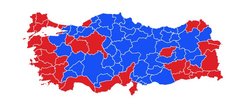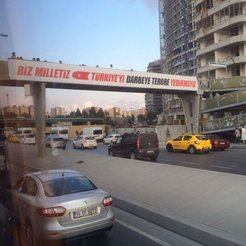What has Turkey voted for?
Authors: Ceren Deniz and Lale Yalçın-Heckmann
April 24, 2017
In a referendum on 16 April 2017, Turks voted by a small majority to adopt an executive presidency system radically different from the republican regime that had been in place since 1923.The ‘yes’ and ‘no’ campaigns were carried out under the state of emergency imposed since 15 July 2016 following an attempted coup. This was allegedly masterminded by Fettullah Gülen, a religious leader in self-imposed exile in the USA for many years. The results of the referendum show that the three largest metropoles (Istanbul, Ankara and Izmir) voted No, as did more developed coastal regions, but also less developed provinces in south-east Anatolia populated mainly by Kurds. The provinces of Çorum and Isparta where we carry out our REALEURASIA projects belong to the ‘yes’ bloc. We will provide general observations of the content of the campaigns and the results and then give more specific insights into these two provinces regarding the political dynamics that brought about the two blocs.

Overall in Turkey the supporters of the proposed constitutional changes received 51,4% of the total votes, hence a slight majority over 48,6% ‘no’ votes. Both in Çorum and Isparta the ‘yes’ votes were above Turkey’s average: in Çorum this was 64,5% and in Isparta 56,0%. Allowing that the results are being contested with accusations of fraud and procedural irregularities and there are still protests on the streets, what can we read from these results about the region and Turkey in general?
What was on the table for the Referendum of 16 April and how were the ‘yes’ and ‘no’ campaigns carried out? Very broadly, the proposed amendments grant the president of Turkey executive powers that allow him/her to curtail the legislative power of the parliament and at the same time dominate the judiciary by appointing most of its members. It means a fundamental change to the republican system of Turkey and this has been propagated by the AKP as leading the way to ‘a new Turkey’. The campaign for the ‘yes’ votes was led by the ruling party AKP, supported by MHP (National Movement Party) leadership. President Erdoğan carried out a campaign himself by appearing on banners and asking for yes votes in his public speeches and meetings. The ‘no’ campaigners, primarily the main opposition party CHP (Republican People’s Party), the pro-Kurdish HDP (People’s Democracy Party) – whose many parliamentary members and leaders are in jail accused of treason – and civilian movements have had less funding and have been on the whole prevented from a free and equal campaign.
In both campaigns, people of all ages played an active role distributing brochures and trying to talk people into one or another side on the streets of all cities. However because the No campaign had less media coverage, urban and young No campaigners used social media, circulated visual illustrations of what the proposed amendments will bring about and produced videos of street interviews with various people who explain the reasons for their votes. Their main arguments for voting No were that the constitutional changes will solidify the president’s overarching powers, creating a one-man regime that dismantles all mechanisms for checks and balances and that protects him and his party from future trial for their alleged crimes. All of this did find a broad audience and could explain the success of ‘no’ votes in large cities and modern and developed coastal parts of Turkey.

Given widespread unrest due to purges in all state departments, detentions and accusations of maltreatment in prisons since the attempted coup and subsequent economic problems (the Turkish lira has lost about 1/3 of its exchange value since then), the AKP had difficulty in explaining the need for the amendments. Sections of the public interpreted the reason for the referendum as simply a ‘yes’ or ‘no’ for Erdoğan’s rule. He used a very polarising language during the campaign, accusing the opposition parties and groups of being traitors if not losers. The ‘yes’ block has effectively mobilized the dualism between “our brothers/us versus them” as President Erdoğan likes to put it in his public speeches. “They” (onlar) is a polemical and populist category that can be filled with any group of people in Turkey. Depending on the context it can be the Kurdish politicians or Kurds in general, academics or those with higher education, followers of Gülen, students, Gezi protest supporters, those who internalized republican reforms in general, those who do not want to reject the West as enemies, or the Western leaders and even the West as an entity; in sum, ‘our enemies’. In their campaign brochures, the reasons AKP listed as to why people should vote for ‘Yes’ are permanent stability, effective action for faster economic development and allocation of services, less bureaucracy, and strong legislation. One might therefore think that ‘yes’ voters in provincial towns such as Çorum and Isparta were convinced by the promises of a new system and that they too felt emotions of fear and vengeance toward the designated enemies, in line with the populist sentiments of anti-Europeanism and anti-Kurdish policies. But how true is this?
How did voters respond to these campaigns in Çorum and Isparta?
The referendum of April 2017 is the latest in a series of votes on constitutional changes. In the previous 2010 constitutional referendum Çorum voted nearly 68% for the changes urged by the AKP government; the figure in Isparta was nearly 58%. In November 2015 in the parliamentary general elections AKP together with the nationalist MHP (National Movement Party) received nearly 83% of the votes in Çorum. Considering that the MHP leadership entered the last referendum supporting the amendments of AKP, one could interpret a vote of only 64.5% ‘yes’ in Çorum as a dramatic decline for the conservative, nationalist and Islamist politics. Similarly in November 2015, 74% of the votes in Isparta went to AKP and MHP; whereas in the last referendum the ‘yes’ bloc of AKP and MHP went down to 56%. It is all too tempting to explain the loss of some 21% (this was the percentage MHP received in November 2015 elections in Isparta) as being the votes of the MHP rebels, since an important group of dissenters from MHP had called for voting ‘no’, but we have no evidence for this interpretation. It can equally be suggested that the ‘yes’ votes coming from MHP might have replaced the loss of the votes from Gülen movement and its own AKP supporters and this shift might have prevented a stronger loss of conservative nationalist votes.
It seems likely that some AKP voters as well as supporters of the MHP voted ‘no’ in this referendum. Why? One possibility is a loss of trust towards AKP because of it gave up its pragmatic politics of early 2000s and has been accelerating polarisation. The purges against those accused of being Gülen supporters have created many resentful families who lost their sources of income as well as their party support. In Çorum, for example, Fatma is a young, modern, conservative, working woman who had voted for AKP since its foundation. She voted No in this referendum, however, despite her husband’s dedication to AKP, most probably because her brother was taken into custody with fabricated accusations. From time to time, she voices her disturbance by the polarization in the society. Another couple, both elderly hacılar (meaning they have done the Islamic pilgrimage) and leading a humble religious life, voted No because they thought the future was unclear and the party is no longer trustworthy. Their grandson lost his hardly found job in a Gülen related broadcasting channel after the purges started; luckily he was not investigated himself. Besides economic problems, many people were concerned about their constitutional rights that would ideally guarantee a safe and fair future for the next generations.
The crisis of the Turkish lira has caused many people to lose the value of their savings or necessitated increased spending. Since most firms do not depend on imported raw materials, however, most businessmen report that the crisis has not affected them; they criticise the fuss about economic crisis as a smear campaign to hurt AKP. Sinan, a Çorum businessman in the service sector and a CHP voter, however indicated the opposite, saying that he was not able to collect his money from firms shut down due to criminal allegations. His account provides reason to believe that AKP supporting businessmen might also have been affected in a similar way.
In Isparta in the summer of 2016 there were frequent shock waves in the city’s business circles when businessmen were taken into custody for being an alleged Gülen follower. One prominent construction firm whose name was to be seen on many modern new office blocks and residential buildings was taken over by the state attorney and the owners detained. Mehmet, a pious businessman known to rose pickers as generous to the poor, was arrested under similar allegations. The state university has led the way nationwide in dismissing hundreds of administrative and academic personnel before and after the attempted coup. Many condoned this, because the internal Gülen networks really were conducive to nepotism and corruption.
Nevertheless, despite the loss of votes in this referendum, the provinces still support religious, nationalist and conservative political trends, accept Erdoğan as their leader and his government as having brought economic wealth to the commoners. Many of the supporters in the metropoles as well as in the provinces perceive Erdoğan as an extraordinary and a world leader who represents their values and challenges European supremacy, both culturally and economically. This is manifested in the provinces mainly by people being satisfied in reaching consumer goods and their pride of the new modern infrastructures built in this era. On the other hand, one must take into account that in the last 15 years the AKP has created an economic, political and social network for its members, who demonstrate this by party membership, taking part in local and national associations, joining certain social events, and behaving in certain ways. Many people are dependent on these networks for their economic interests and social status. Whether it is a janitor at a primary school who found his/her job by becoming a member of the party, or a young professional waiting for a raise at a state department, a local businessman who is waiting for the next public bid for the restoration of a local bazaar, or an investor checking the stock market every second1, these people desire stability and therefore see their destiny and livelihood as bound up with the party. As they would say: “we are all in the same boat.” These pragmatic politics (in the sense of pursuing less ideological objectives) and economic interests might not always be as visible as having the same value system or identifying with the party and its leader. However, they cannot be denied.
Note
1 All examples are real persons from Çorum and Konya.

